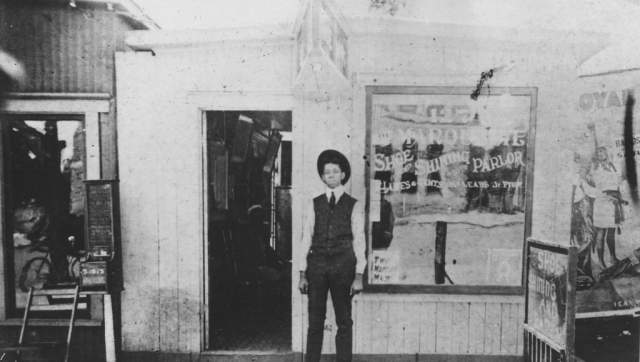African American Heritage
Historical Timeline
1847-1900 *
Lansing’s African American heritage is as old as the city itself. Lansing’s first Black resident, James Little was a freed enslaved person from New York and settled a small farm in nearby Eaton County in 1847. Some 20 years later he moved closer to Lansing and was extremely active in his church and other community activities and became a beloved citizen. He died March 10, 1884. “His funeral was held in the A. M. E church, and perhaps no funeral in the city was attended by a larger number of representative people. The sermon was preached by Rev. W H. Thompson, of the Central M. E church, of which he was a member.”
Lansing’s black population increased slowly during the remainder of the nineteenth century. Many Black settlers came from other northern states and from the upper south. Some were Canadians descended from escaped enslaved people. Others came from elsewhere in Michigan, with the majority of those hailing from Cass County (Freed enslaved communities had been established there before the Civil War.)
1900-1929
As more families came, a clear African American community began to develop in Lansing. By 1900, most Black residents lived on the city’s west side, close to where the Oldsmobile plant would one day stand. They tended to be more educated and skilled than Blacks in large urban areas. Sixty percent of Lansing’s African Americans were homeowners, and a few owned businesses. Discrimination did force most to seek jobs in the service industry, however, and many worked as waiters, cooks and domestic servants.
A large-scale migration of African Americans from the Deep South to the North began around 1915. Blacks moved to Lansing in greater numbers than ever, while whites began to more actively enforce segregated housing.
1929-1970
Segregation became even more pronounced during the Great Depression. With a growing African American population and fewer housing opportunities, Lansing’s main Black neighborhood (still located by the Oldsmobile plant) became increasingly crowded. Housing shortages during and after World War II exacerbated the situation.
In the 1960s, the city began practicing urban renewal. Interstate 496 was constructed through the heart of the city, bisecting the main black neighborhood. The project claimed 890 dwellings, many of which were occupied by African Americans. An Oldsmobile expansion project and two urban renewal projects around the Capitol destroyed even more housing.
1970-Today
The urban renewal projects ended by 1970. That year, about eleven thousand Blacks lived in Lansing. By the year 2000, that number had grown to twenty-six thousand. The number continues to grow, as Lansing itself becomes more modern and diverse.
Sites of Interest
4705 Martin Luther King Blvd., Lansing 48910 (Outside)
Malcolm X’s parents, Earl and Louise Little and their family came to Lansing for a better life and were among the victims of discrimination. In 1929, they were sued for buying property in Lansing’s Westmont subdivision. Westmont property deeds explicitly forbid sales to anyone “not of the Caucasian race.” The court ordered the Littles to move, and a fire (believed by the Littles to be caused by white arsonists) soon destroyed the property. For more on Malcolm X’s life and experiences in Lansing listen to this podcast from WKAR Media - Michigan State University.
1029 W. Barnes Ave., Lansing 48910
This charter school opened in 1995 as a charter school patterning its curriculum after the teachings of civil rights leader Malcolm X who spent much of his youth in Lansing. The school closed in 2019.
702 W. Kalamazoo St., Lansing, 48909
Exhibits include audios of favorite Motown songs and the piano from the Michigan School for the Blind on the north side of Lansing where Stevie Wonder attended school.
Read More1134-1136 Shepard St., Lansing 48912 (Indoors)
An extensive collection of pictures, artifacts, printed material and displays which examines the African presence in Africa, Asia, Europe, Australia and the Americas. Call ahead for tour reservations.
Read More301 N. Butler St., Lansing
Founded in 1945, the original purpose of the Clubhouse was to provide a designated meeting place for all minority women and to cultivate peace, harmony, and happiness among citizens irrespective of race, color or creed such that all people may enjoy a higher standard of living for peace and contentment.
Read MoreDr. Robert L. Green was the first Black homeowner in East Lansing, the first Black dean at MSU and a prominent civil rights activist. Green filed a federal lawsuit after he was denied a chance to buy a house in East Lansing even though he was an employee at MSU. According to Green, the house was offered to white people but repeatedly refused to him. Green said that John Hannah, then president of Michigan State University, offered to buy a home and then sell it to Green, but Green has stated that he declined because it did not solve the problem for potential Black homeowners after him. After the lawsuit, Green later purchased a house at 207 Bessemaur Drive where he would send his children to Pinecrest Elementary as the first to integrate into a previously segregated school.
Read MoreAnnual Celebrations
Lansing Juneteenth Celebration - June
Since 1993, the Lansing Juneteenth Celebration has served as a respected voice in the community, with the city of Lansing as its backdrop.
Read MoreAfrican American Parade - June
In 2015, the African American Parade, became a part of the Lansing Juneteenth Celebration. The parade was dedicated in memory of its founder, the…
Read MoreMLK Holiday Luncheon - February
Promoting awareness and appreciation of the Civil Rights movement and advocacy of the principles and legacy of Dr. Martin Luther King Jr., this…
Read MoreHistorical Markers
Location: Vincent Ct. at Martin Luther King Jr. Blvd.
Born Malcolm Little in Omaha, Nebraska, in 1925, Malcolm X lived in a house on this site in the 1930's. His early life was marked by the violent death of his father, the Reverend Earl Little, on the Michigan Avenue streetcar tracks. Under severe economic stress, the family separated, and in 1937, Malcolm was sent to Mason. After a public school teacher discouraged his ambition of becoming a lawyer, Malcolm at fifteen left for Boston and New York. He became involved in street crime and was arrested in Massachusetts. In prison he converted to the teachings of Elijah Muhammad and read widely in history and philosophy. He also developed an understanding of Black self-hatred and came to see his years in Lansing as common to Black experience. Released in 1952, he joined his family in Detroit, and began his new life as a Muslim. When his talent for preaching was recognized, he moved to New York to head Temple Seven. He founded the Nation of Islam's weekly newspaper, Muhammad Speaks, and traveled the country organizing new temples among its followers. In 1959 a television program brought him to public attention as the principal minister of the Nation. Preaching Black pride and autonomy, he openly articulated the extent of racial discontent in our society. He broke with the Nation in 1964 and founded Muslim Mosque, Incorporated. A trip to Africa in the same year helped him enlarge his thinking in international problems. By 1965 when he was assassinated, he had become an eloquent spokesman for the oppressed everywhere. His influence continues through his recorded speeches and the Autobiography of Malcolm X, a landmark of twentieth century social thought.
For more information about Malcom X in Lansing, WKAR’s Stateside podcast:
Erected 1975 by Michigan History Division, Department of State. (Marker Number S0455.
Read MoreLocation: 301 N. Butler St., Lansing
The Lansing Association of Women’s Clubs became a reality through the efforts of Dr. Rose T. Brunson, Mrs. Gertrude Lee, and Mrs. Ina B. Majors. They approached Mr. R.E. Olds who made a contribution of four thousand dollars for the down payment and reconditioning of a house with a store annex at the corner of Logan (now MLK Jr. St.) and William Streets. A mass membership campaign conducted at Hillsdale (now Union) Baptist Church in July 1945 with 100 ladies contributing $5.00 each climaxed the fundraising efforts.
Founded in 1945, the original purpose of the Clubhouse was to provide a designated meeting place for all minority women and to cultivate peace, harmony, and happiness among citizens irrespective of race, color or creed such that all people may enjoy a higher standard of living for peace and contentment.
In 1984 the current location was designated as a historical site (the Ulysses D. Ward House) and was listed on the State Register of Historic Places by the Michigan Historical Commission.
First Churches
Address: 500 S Martin Luther King Jr Blvd, Lansing, MI 48915
Phone: (517) 485-7705
Union Missionary Baptist Church was the first African-American Baptist Church established in the City of Lansing. Union Baptist has come a long way from its humble beginnings in 1909, first established as the Hillsdale Street Baptist Church by a small group of worshippers meeting in a living room. The group soon moved its religious services to a small building on the corner of West Main and Division Streets and in 1937 changed the name of the church to “Union Missionary Baptist Church.”
Next the church purchased an old Elks building on Moores River Drive. The facility was remodeled and later named River View Place and served the community as a banquet, restaurant and leadership facility for five years. This was the only facility of its type—owned and operated by African Americans in the mid-Michigan area.
By 1995 the congregation had purchased land west of its location in 1995 and proudly marched across northbound Martin Luther King, Jr. Boulevard for the groundbreaking ceremony. This new campus would include an 84,610 square foot sanctuary, a chapel, and a 53,700 square foot Family Life Center which includes a chapel, a regulation gymnasium, several classrooms, a computer lab, prayer garden and commercial kitchen. The current congregation is 700 strong.
Address: 3500 W Holmes Rd, Lansing, MI 48911
Phone: (517) 882-5722
Trinity African Methodist Episcopal Church of Lansing is the oldest black church in the city. Its first services were held in a building on North Washington Avenue. The church formally organized by the Reverend Mr. Henderson of the British Methodist Episcopal Church in 1866, was first called the Independent Methodist Episcopal Church. In 1875 it was reorganized as Bethel A.M.E. Church. In 1902, upon the death of the Reverend George R. Collins, the pastor for many years, the church was renamed the George R. Collins A.M.E. Church. It was incorporated in 1906. The church received its present name, Trinity A.M.E. Church, in 1964.
During the church's first decade, the congregation purchased a small frame building and moved it to a site on the 100 block of North Pine Street. In 1877 a modest brick church was erected near the original site. It served the congregation for eighty-eight years. In 1965 the Congregation was forced to relocate to make room for the State Capitol Complex building project. Selling its downtown property to the state, Ingham County's oldest black congregation then moved to this ten-acre tract, where it built a church and a parsonage. Starting with twenty-one members, the church had over four hundred members by its one hundredth anniversary in 1966.
20 Lansing Trailblazers **
Stuart Dunnings Jr.
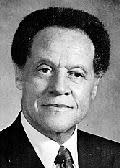
Stuart Dunnings Jr. was Lansing’s first Black lawyer. He opened a law practice in 1950. Dunnings served as president of the local NAACP and was a champion for civil rights issues. One of his first cases involved Black students from Detroit playing in a basketball tournament. The students were denied hotel rooms in Lansing. Dunnings won the case against the hotel, but got a judgment of only 21 cents. In an interview with the LSJ in 2006, Dunnings recalled, “The judge said I proved they were discriminated against, but I couldn’t prove damages.” Dunnings died in 2010.
Raymond Riddle
Raymond Riddle was Lansing’s first Black police officer. He was hired in 1950. Riddle eventually left the police department to become a brick mason, partly because bricklaying paid more. Riddle was a brick mason and foreman for 20 years, became a state building inspector in 1977 and retired in 1994 as an assistant chief with the Michigan Department of Labor’s Bureau of Construction Codes.
William Harrison
William Harrison wanted to design roads and bridges in the mid-1930s but was turned down by the president of Tennessee State University despite his impeccable academic record. He was told, “you won’t be able to get a job because no one is going to hire a Negro engineer.” Harrison switched to medicine, completed medical school in 1944 at Howard University, came to Lansing and opened a practice in 1946, becoming the city’s first Black doctor. He died in 1997.
Olivia Letts
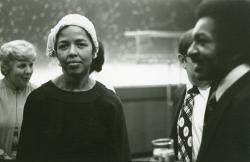
Olivia Letts was the first Black female teacher to be hired in Lansing --- in 1951. Ten years later, she was named the city’s first Black principal at a new and predominantly white Post Oak Elementary, which had three Black students. Letts also was among the district’s first Black administrators. In 2016, she was inducted into the Michigan Women’s Hall of Fame. Letts died in 2020.
Rudolph "Rudy" Wilson"
Rudolph “Rudy” Wilson was the first Black chemist and salaried employee hired by Oldsmobile, in 1955. He negotiated continuously over the years to ensure that the company followed equitable hiring practices. He retired in 1987. Wilson served as branch president of the local NAACP from 1977 to 1986. He was appointed in 1987 to serve on the Ingham Intermediate School District board. He died in 2015.
James Riley
James Riley, a World War II veteran, and his wife, Deresa, founded the Riley Funeral Home in 1957. It is the oldest Black-owned business in Lansing. They operated the Riley Funeral Home until their retirement in 1993. Riley died in 2016.
A. Gregory Eaton
A. Gregory Eaton became Michigan’s first Black lobbyist in the mid-1960s. He joined Karoub Associates in 1968 and is counsel to the firm. Eaton has owned several businesses and is the president and owner of Gregory’s Soul Food Restaurant. He also is a former executive assistant and legislative counsel for the Michigan Automobile Dealers Association.
Joel Ferguson
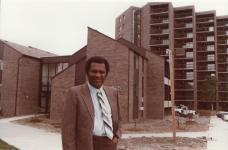
In 1967, Joel Ferguson (pictured right) became the first African American elected to the Lansing City Council and the youngest person, as well. He was also the first African American to serve on the Ingham County Board of Supervisors. He is co-founder of F & S Development Company, and the developer of multi-family residential complexes throughout Michigan. He was a co-founder of Lansing television station WFSL-TV (Channel 47) and the founder of Lansing’s WLAJ-TV (Channel 53) television station. He is owner and developer of many office buildings in the Lansing area and one of the original organizers of Capitol National Bank. Ferguson was first elected to the MSU Board of Trustees in 1986 and has been re-elected three times. He now serves as vice-chairman.
Hortense Canady
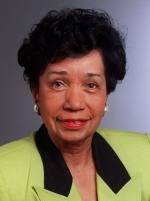 Hortense Canady was the first black person elected to the Lansing school board in 1968. She was one of five board members recalled in 1972 for advocating a school desegregation plan. Canady went on to become the first executive director of the Lansing Community College Foundation. She was a founding member of Les Meres et Debutante and the Lansing Alumnae Chapter of Delta Sigma Theta Sorority Chapter Inc. Canady was inducted into the Michigan Women’s Historical Center & Hall of Fame in 2002. She died in 2010.
Hortense Canady was the first black person elected to the Lansing school board in 1968. She was one of five board members recalled in 1972 for advocating a school desegregation plan. Canady went on to become the first executive director of the Lansing Community College Foundation. She was a founding member of Les Meres et Debutante and the Lansing Alumnae Chapter of Delta Sigma Theta Sorority Chapter Inc. Canady was inducted into the Michigan Women’s Historical Center & Hall of Fame in 2002. She died in 2010.
Grady Porter
Grady Porter became the first black person elected to the Ingham County Board of Commissioners in 1968, having been encouraged by family and friends to run for political office. Grady served on the commission for 24 years, retiring from politics in 1992. In 1992 the Ingham County building at 313 W. Kalamazoo was named the Grady J. Porter Building. Porter died in 2007.
Blanche Martin
Blanche Martin took the oath of office as the first black member of the Michigan State University Board of Trustees on Jan. 6, 1969. Martin, a Class of 1959 graduate, served two consecutive terms on the board. A former football star at MSU, he was named to the All-American academic first team (1957-58) and was awarded the Ross Trophy for outstanding academic and athletic achievements (1959). He earned a doctorate in dental surgery from the University of Detroit in 1967 and established his dental practice in East Lansing.
Clifton Wharton Jr
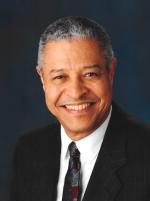 In January 1970, Clifton Wharton Jr. (pictured right) began his eight-year presidency at Michigan State University. Wharton was the first black president of a major U.S. university. Major contributions during his tenure included the establishment of the Presidential Commission on Admissions and Student Body Composition to study future enrollment policies, the Presidential Fellows Program, and the start of the process that ultimately lead to the construction of a new performing arts center, later named the Wharton Center for Performing Arts in honor of Wharton and his wife Dolores.
In January 1970, Clifton Wharton Jr. (pictured right) began his eight-year presidency at Michigan State University. Wharton was the first black president of a major U.S. university. Major contributions during his tenure included the establishment of the Presidential Commission on Admissions and Student Body Composition to study future enrollment policies, the Presidential Fellows Program, and the start of the process that ultimately lead to the construction of a new performing arts center, later named the Wharton Center for Performing Arts in honor of Wharton and his wife Dolores.
Dr. Alexa Canady
Dr. Alexa Canady was the first black female neurosurgeon in the United States. Canady was chief of neurosurgery at the Children’s Hospital of Michigan from 1987 until her retirement in 2001. In 1989, she was inducted into the Michigan Women’s Hall of Fame. Born in Lansing, Canady is the daughter of the late Hortense Canady and the late Clinton Canady Jr.
Sam Hopkins
Sam Hopkins became Lansing Fire Department’s first black fire chief in 1988. He hired in as a firefighter in 1965 at No. 1 Fire Station, then located at Shiawassee Street and Grand Avenue. He also was the first black engineer, lieutenant, and captain. Hopkins retired from LFD in 1994. He became the first black fire chief in Ann Arbor in 2005 and was there until 2009. Roger Roberts was the first black firefighter hired by the Lansing Fire Department. He served from July 8, 1962 to Feb. 17, 1973.
Able Sykes Jr.
Able Sykes Jr. was the second president – and first black president – of Lansing Community College. He held the position from 1990 until he retired in 1999. Sykes was the first black person to serve as chairman of the Association of Community Colleges board of directors. The college’s Able B. Sykes J. Technology and Learning Center is name in his honor.
Dr. Eva Evans
Dr. Eva Evans has been a leader in education since 1965. She served in a number of administrative positions in the Lansing School District, from director of elementary education to being the first female deputy superintendent of Lansing public schools. Presently she is chair of the Lansing Community College Foundation. In 2006, Evans was inducted into the Michigan Women’s Hall of Fame. She died in 2020.
Paula Cunningham
Paula Cunningham started her career with Lansing Community College in 1981 as an associate professor. She rose to become the school’s first female president in 2000. In 2006, Cunningham became the first female president and CEO of Capitol National Bank. Cunningham was also the first African American woman to chair the board of the Lansing Regional Chamber of Commerce. Cunningham was inducted into the Michigan Women’s Hall of Fame in 2013.
James Bibbs
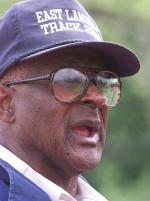 James Bibbs is the longest tenured track and field coach in Michigan State University’s program history. In 1968 he became the first black coach at MSU and in 1975 he became the first black head track coach in the Big Ten. During Bibbs’ career, his student-athletes won 52 Big Ten titles, earned All-America honors 26 times, claimed three NCAA titles and set two world records. Bibbs retired as head coach in 1995.
James Bibbs is the longest tenured track and field coach in Michigan State University’s program history. In 1968 he became the first black coach at MSU and in 1975 he became the first black head track coach in the Big Ten. During Bibbs’ career, his student-athletes won 52 Big Ten titles, earned All-America honors 26 times, claimed three NCAA titles and set two world records. Bibbs retired as head coach in 1995.
Claude Thomas
Claude Thomas was the first black Ingham County Assistant Prosecutor, one of Lansing’s first black police officers, and Lansing’s first black District Court Judge. He was also the first black student and graduate of Cooley Law School. He died in 2008.
Judge John "Jack" Davis
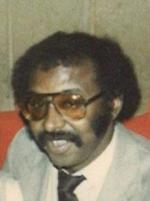 Lansing District Judge John “Jack” Davis was a judge for almost nine years. Before that, he was a trial attorney with the U.S. Dept. of Justice, then went into private practice in 1985, where he successfully litigated school, housing and employment discrimination cases before U.S. District courts, the U.S. Court of Appeals and the U.S. Supreme Court. He died in 1995.
Lansing District Judge John “Jack” Davis was a judge for almost nine years. Before that, he was a trial attorney with the U.S. Dept. of Justice, then went into private practice in 1985, where he successfully litigated school, housing and employment discrimination cases before U.S. District courts, the U.S. Court of Appeals and the U.S. Supreme Court. He died in 1995.
**From Lansing State Journal
Earvin "Magic" Johnson
We would be remiss if we did not include Earvin “Magic” Johnson in this list as a local Lansing celebrity. Johnson was born and raised in Lansing and after winning championships in high school (Everett) and college (Michigan State University) Johnson was selected first overall in the 1979 NBA draft by the Los Angeles Lakers. He won a championship and an NBA Finals Most Valuable Player Award in his rookie season, and won four more championships with the Lakers during the 1980s. He played point guard for the Lakers for 13 seasons.
Dr. Robert L. Green
Robert L. Green’s presence as a community leader, policy maker, professor, and MSU’s first Black dean a was a galvanizing force that influenced the university’s efforts to attract and retain more diversity in students, faculty, and staff. He worked tirelessly to ensure that students obtained degrees that would prepare them for life after MSU. It was also Dr. Green’s change agent strategies and impact in public housing and education that resulted in Martin L. King Jr.’s request to have him serve as the Southern Christian Leadership Conference education director.
The East Lansing School Board unanimously voted in 2021 to re-name Pinecrest Elementary School to honor Dr. Robert L. Green, the first Black homeowner in East Lansing and civil rights activist. The Robert L. Green Commission, which was formed in 2021, was created to commemorate Green and his efforts to improve the East Lansing community for people of color in the 1960s.
In 1962, President Kennedy signed Executive Order 11063. This order, “prohibited discrimination on the basis of race in the sale, leasing, rental, or other disposition of properties and facilities owned or operated by the federal government or provided with federal funds. The goal of this order was to provide equal housing opportunities regardless of race or ethnicity. Green, who worked for Michigan State University as an associate professor of education, was denied his right to own a home and filed a complaint to the Federal Housing Administration.
In 1964, Green was able to purchase 207 Bessemaur Drive, where he would send his children to Pinecrest Elementary as the first to integrate into a previously segregated school.
Elaine Hardy, diversity, equity and inclusion administrator of East Lansing, also worked on the Robert L. Green Commission. Hardy has worked on the commission in an effort to not only rename the school, but to place a Michigan historic marker across from 207 Bessemer Drive, the house that Green purchased in 1964.
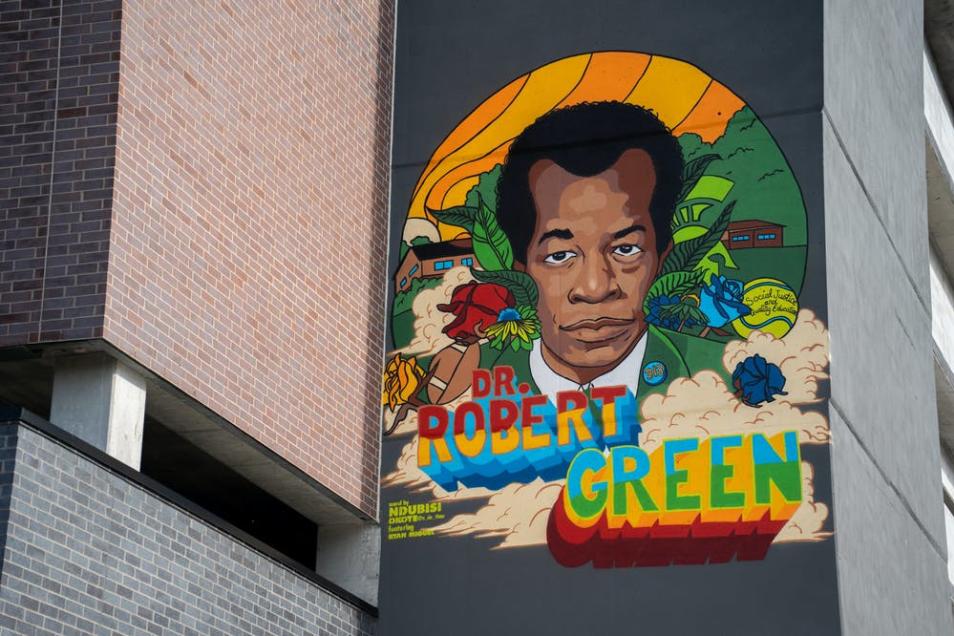
A mural honoring Dr. Robert L. Green, an East Lansing civil rights activist and faculty member, was painted by Michigan-based artist Ndubisi Okoye. Pictured on May 25, 2022.— Photo by Sheldon Krause | The State News
Black Owned Establishments
All Body Kneads
All Body Kneads is owned by Certified Independent Therapeutic Massage Therapist Bilky Joda-Miller who is also a Member of the…
Black Wall Street of Lansing
BUILDING EQUITY AND ECONOMIC STABILITY FOR FUTURE GENERATIONS. Black Wall Street or Lansing is a non-profit organization formed to…
Cravings Gourmet Popcorn-Old Town
Cravings Gourmet Popcorn and Soda Pop Market was created in 2005 by Chad Jordan. It's his love for having a good time that…
Elderly Instruments
Elderly Instruments, a family-owned and world-renowned music store in Lansing's historic Old Town, specializes in stringed and…
FieldHouse
FieldHouse is the perfect place for you and your friends to gather and watch a game, drink beer, listen to a DJ spin your favorite…
Goodfellas Bagel Deli - Capital City Market
Located inside Downtown's Capital City Market. Composed of two Lansing natives and close friends comes the birth of Goodfellas…
MaCnificent Photo Booth
We make a statement without saying a word. We create gifs, photos, boomerangs, and videos for your entertainment. Rent one of our…
Mahabir Wellness
Mahabir Wellness PLLC, in its current form, was established in 2016 in Haslett to provide a boutique experience for clients…
McAlister's Deli
As soon as you enter, you'll be greeted by our unique menu filled with a wide variety of soup, sandwiches, spuds, salads, sweets…
Metro Melik 517
It's more than a cool gift. MM517 is an artful approach to gift-giving. MM517 is an art gallery with apparel, curated art, gift…
Middle Village
The Shops at Middle Village is your one-stop shop in Downtown Lansing for all things local. When you visit The Shops at Middle…
Moneyball Sportswear
Desmond Ferguson has always had a passion for sports, especially the game of basketball. The name Moneyball was given to Ferguson…
Mr. Leslie's Cheesecakes
Marcus Leslie is a native of Detroit who has loved baking since he was a child. Mr. Leslie spent decades developing his recipes…
Nature's 92
Click to see where we are this week in greater Lansing SEA MOSS IS THE SUPERFOOD OF ALL FOODS! Sea Moss is antiviral…
Skin Studio 211 - East
Skin Studio 211 offers a full range of services and specialties at a price that cannot be beaten. We pride ourselves on providing…
Stellableu Designs
Stellableu is passionate about bringing your vision to life. We want to help make your celebration memorable and elevate your…
Sweet Encounter Bakery Cafe
Sweet Encounter is a gourmet bakery and café specializing in scrumptious, made from scratch gluten-free, soy-free, and peanut-free…
The Comfort Zone Cigar Lounge & Bistro
The Comfort Zone Cidgar Lounge and Bistro is available to rent for day meetings, parties, events, and more. Offering onsite food &…
The New Citizens Press
The New Citizens Press is dedicated to providing Blacks and Latinos information, support and reassurance via their publication…
The Venue by Eleven 11 Events
The Venue by Eleven 11 Events is Lansing, Michigan’s hottest new space for weddings, corporate and networking events, birthday and…
- Capital City Soul Food
- 3280 S Waverly Rd., Lansing
- (517) 993-5594
- Culver's
- 6250 S Pennsylvania Ave., Lansing
- (517) 575-6095
- Everything Is Cheesecake
- 5443 South Cedar St., Lansing
- (517) 862-2979
- Finger Lickin Chicken and Fish
- 2317 West Michigan Ave., Lansing
- (517) 528-3253
- Gregory's Soul Food
- 2510 N MLK Jr Blvd., Lansing
- (517) 323-7122
- Kingston Kitchen
- 4749 Central Park Dr., Okemos
- (517) 708-8322
- Juice Nation
- 111 S Washington Sq., Lansing
- (517) 372-7700
- Lansing Made
- 2722 E. Michigan Ave. Ste 219, Lansing
- http://lansingmade.com
- Lil' BBQ Shack
- 5920 S Cedar St., Lansing
- (517) 975-5328
- Michigan Premier Events LLC
- 124 W. Allegan St., Ste 1410, Lansing
- Info@MichiganPremierEvents.com
- Mo Wings
- 424 S. Washington Sq., Lansing
- (517) 721-1770
- Soul Nutrition
- 222 S. Washington, Lansing
- The Smoke N' Pig
- 908 Elmwood Rd., Lansing
- (517) 582-5100
- Wing Heaven
- 3418 Pleasant Grove, Lansing
- (517) 977-0630
Paving the Way
The Historical Society of Greater Lansing has done extensive research into the aftermath of interstate 496 cutting through the middle of Lansing and uprooting a thriving, predominantly African American neighborhood in the name of progress. Keep up with their latest findings through the Paving The Way Project.


